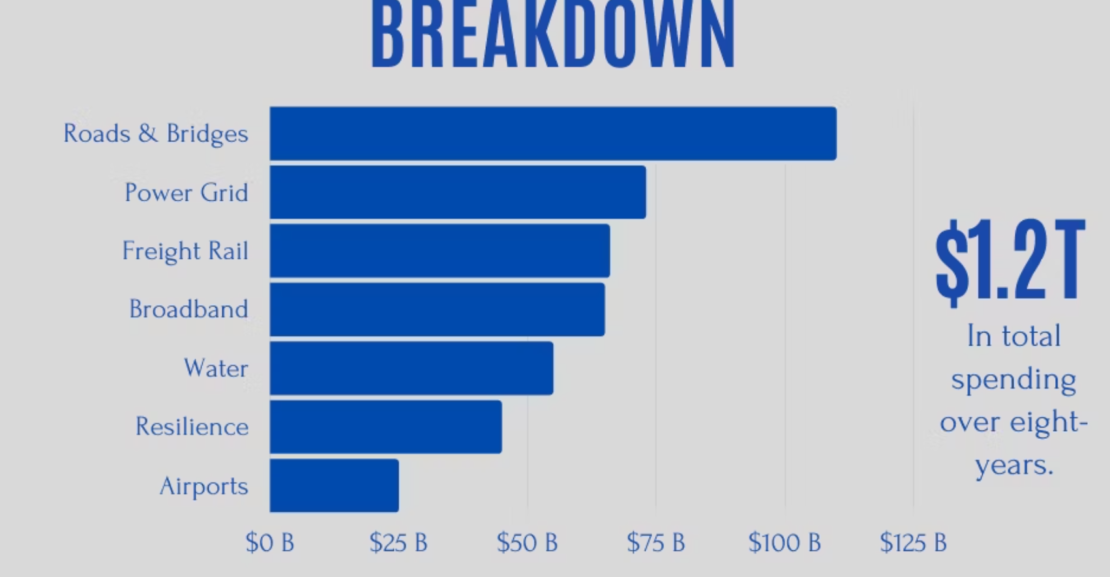The Infrastructure Bill, a monumental piece of legislation, has captivated the attention of the construction industry in the United States. As one of the most significant investments in infrastructure in recent history, it holds the potential to reshape the landscape for contractors across the nation. The bill, officially titled the Infrastructure Investment and Jobs Act, allocates substantial funding to address critical infrastructure needs, including transportation, broadband, water systems, and energy networks. But what does this mean for contractors, the backbone of the construction sector?
Opportunities for Contractors:
1. Increased Projects: The Infrastructure Bill promises a surge in construction projects, particularly in the transportation sector. Roads, bridges, public transit, and airports are expected to see substantial improvements, translating into a greater demand for contractor services.
2. Job Growth: With more projects on the horizon, contractors can anticipate increased hiring to meet the demand for skilled labor. This can boost employment opportunities in the construction industry.
3. Infrastructure Modernization: The bill prioritizes upgrading and modernizing aging infrastructure. Contractors specializing in advanced construction technologies, sustainable practices, and innovative materials may find a wealth of opportunities.
4. Broadband Expansion: The focus on expanding broadband access presents opportunities for contractors involved in telecommunications infrastructure, including laying fiber-optic cables and building network infrastructure in underserved areas.
5. Environmental Initiatives: The bill emphasizes sustainability and resilience, creating openings for contractors with expertise in green construction, renewable energy, and projects that enhance climate resilience.
Challenges and Considerations:
1. Labor Shortages: An increase in construction projects may exacerbate existing labor shortages. Contractors may face challenges in finding and retaining skilled workers.
2. Supply Chain Disruptions: The ongoing supply chain disruptions, which have affected the availability and cost of construction materials, may persist and impact project timelines and budgets.
3. Regulatory Compliance: Contractors must navigate a complex regulatory environment, ensuring they adhere to the bill’s requirements, including prevailing wage standards and environmental regulations.
4. Competition: As more contractors enter the market to capitalize on the bill’s opportunities, competition for projects may intensify, potentially affecting profit margins.
5. Funding Uncertainty: The Infrastructure Bill’s long-term funding mechanisms may be subject to changes in political priorities, which could impact the stability of infrastructure projects.
In conclusion, the Infrastructure Bill offers contractors a wealth of opportunities to participate in transformative infrastructure projects. However, it also presents challenges related to labor, supply chains, compliance, competition, and funding stability. Contractors who adapt to these evolving dynamics and stay attuned to the bill’s implementation will be best positioned to thrive in this new era of infrastructure development. As construction professionals, they play a vital role in building and renewing the nation’s infrastructure, making their engagement with this historic legislation paramount to its success.
The Infrastructure Bill - is there a noticeable difference for contractors?
This article discusses the how the Infrastructure Bill, a monumental piece of legislation in the U.S., presents both opportunities and challenges for contractors. It promises increased construction projects, job growth, infrastructure modernization, and broadband expansion. However, contractors may face challenges such as labor shortages, supply chain disruptions, regulatory compliance, increased competition, and funding uncertainties. Navigating these dynamics while staying attuned to the bill's implementation is crucial for contractors looking to thrive in this transformative era of infrastructure development.
